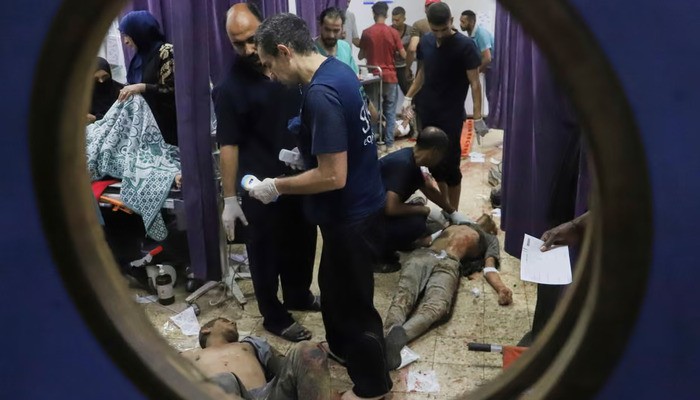Doctors and nurses in Gaza hospitals are warning that extreme hunger is leaving them physically unable to care for the injured and malnourished. As famine deepens across the region, medical staff say they are collapsing from exhaustion, even while performing surgeries, in hospitals that are overwhelmed with patients.
Medical Workers Near Collapse
At al-Shifa hospital in Gaza City, staff members are fainting in operating rooms due to hunger. Dr. Mohammed Abu Selmia, the hospital’s director, said most medical workers haven’t eaten in over 48 hours. “They are in a state of extreme exhaustion,” he explained. “They can no longer function. This will affect medical services because they simply cannot hold on much longer.”
Doctors say they are struggling to stay conscious during shifts that last more than 24 hours. One physician said he and a colleague treated 60 neurosurgery patients in one day, but received no food during their shift. “I can’t even stand right now,” he said.
Empty Markets and Empty Stomachs
With food no longer available in markets, many medical staff are also watching their families suffer. A general practitioner working at al-Shifa said he hadn’t eaten since the previous day. “I spend all day wondering how to find flour or lentils,” he said. “We can’t walk properly anymore.”
At the Nasser medical complex, doctors are seeing a surge in patients suffering from malnutrition. Gastroenteritis, low blood sugar, and fainting spells are now common across all age groups. One surgeon said he was forced to stop mid-operation due to dizziness and weakness. “I hadn’t eaten for two days,” he said. “I feared worsening my condition.”
Rising Toll of Starvation
Dr. Abu Selmia reported that 21 children have died from starvation in just the past three days. “They need specialized nutrition, but nothing is available,” he said. Many victims die quietly in tents or makeshift shelters, their deaths going unreported.
Gaza’s food shortages are not only affecting civilians, but the very people trying to save them. Medical professionals now face a grim choice—continue their work or leave in search of food for their families.
Read: Gaza Crisis Deepens as Israeli Strikes Kill 17
Fear at Aid Distribution Sites
While food is occasionally available through distribution sites operated by the Gaza Humanitarian Foundation, many doctors fear going to these locations. Guarded by Israeli Defense Forces (IDF), these centers have seen deadly incidents. According to the UN, over 1,000 people have been killed trying to access food since May.
Several healthcare workers said they worry about being targeted if they speak publicly. “We’re not only fighting hunger. We’re afraid of what might happen if we go looking for food,” said one volunteer doctor.
System on the Brink
The World Health Organization reports that Gaza’s healthcare system has been decimated by nearly two years of war. Only 19 of 36 hospitals are still functioning. Most are damaged, with limited equipment and supplies. Now, even the surviving medical professionals are running out of the physical strength to continue.
Muath Alser, director of Healthcare Worker Watch, said staff are experiencing “unprecedented levels of food insecurity, lowered immunity, and frequent fainting during rescue operations.” He added, “We need more than statements. We need immediate help.”
Military Response and Criticism
In a statement, the IDF claimed it is working to ensure aid reaches hospitals. “Following incidents involving harm to civilians at food distribution sites, investigations were carried out,” the statement read. “Instructions were issued to field units, and the incidents remain under review.”
But for Gaza’s doctors, that response offers little comfort. Many believe the system is days, or even hours, from full collapse. As hunger and exhaustion rise, hospitals may no longer be able to provide even basic care—leaving patients and staff to suffer alone.
